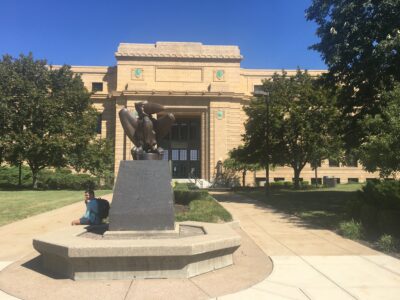Group forms to create 1,500-member union to represent KU faculty members; vote expected in coming months

photo by: Kim Callahan/Journal-World
Strong Hall on the University of Kansas campus is pictured in September 2021.
UPDATED 8:30 A.M. NOV. 15, 2022
Professors and other academics at the University of Kansas are taking public steps to form a union that would represent more than 1,500 KU faculty members.
Several KU faculty members have banded together to form United Academics of the University of Kansas. The group is affiliated with the American Federation of Teachers and the American Association of University Professors.
Now, the question becomes whether there are enough faculty members and instructors on the KU campus who are ready to join a union. The group, in a press release, said it “will be collecting union authorization cards over the coming months, with a secret-ballot vote to officially form a union to follow.”
Organizers of the potential union said there are a host of issues they will tout as reasons to form a union. They include KU’s willingness in 2021 to use a Kansas Board of Regents policy that would have allowed for the suspension of faculty tenure to address financial issues at KU; an “over-reliance” on short-term contracts for many teaching faculty; “stagnant” wages that aren’t competitive with similar universities and a lack of voice in the decision-making process related to academic programs.
“KU has long enjoyed high rankings for academics and recognition as a premier research university, but that status is at risk,” Lisa-Marie Wright, an associate professor in the Department of Sociology, said via a press release.
If a union is formed, it would require KU to collectively bargain with the approximately 1,500 employees on a range of issues, including pay and benefits. Public unions in Kansas have their ability to strike limited somewhat by state law, but there are other actions unions can take that could put pressure on university officials or the operations of the university.
KU has some experience in bargaining with unions. In September, KU and a graduate teaching assistant union settled on a 5% pay increase after two years of negotiations. The 5% pay raise mirrored what KU gave other non-unionized employees.
Pay rates have been a longstanding issue with employees at KU. The 5%, nearly across-the-board pay increase that was given at the beginning of this school year was the largest in recent memory. It came as state legislators approved a budget that grew higher education funding by more than $100 million, also the largest increase in recent memory.
Whether the Legislature will continue to fund higher education at those increased levels in future years is uncertain, and so too is whether KU will continue to offer similar wage increases. KU leaders are conducting a wage survey, but have stopped short of making proposals for future year increases, especially until that survey is completed.
“Collaboration is the best way to solve problems, but that can only be accomplished when faculty and academic staff have a recognized union,” Stephanie Meehan, a clinical associate professor in the Department of Speech-Language Hearing, said in a press release. “With a union we can advocate for what’s best for our students and the university as a whole.”
The idea of creating a union for KU faculty started taking shape before the KU and the Kansas Legislature approved the most recent budget and pay raises. The Journal-World reported in April 2021 that a group callings itself Kansas Faculty United was holding meetings on campus with faculty members about the benefits of unionizing.
That effort came just weeks after the Kansas Board of Regents approved a policy that all public universities in the state could temporarily remove tenure protection from faculty members as universities dealt with financial problems related to the pandemic. Tenure provides job protections to faculty members who have earned tenured status, and often is considered one of the bedrock protections of academic freedom in the American university system.
The Regents policy drew immediate concern from faculty members across the state, and every university except KU came out with a statement saying it did not intend to use the policy. KU said it needed to keep its options open.
By June of 2021, KU Chancellor Douglas Girod said he had determined KU would not need to use the controversial policy to suspend tenure of any faculty members. The Regents earlier this year renewed the temporary policy again, but this time KU said it would not use it, although fellow Regent institution Emporia State University has used it over the protests of faculty members there to cut the size of its university teaching staff.
A few other universities in Kansas already have unions that represent faculty members, including Pittsburg State, Fort Hays State and Johnson County Community College.
A press release from United Academics of the University of Kansas said a host of positions would be eligible to join the new KU union, if it is ultimately formed. Positions include: full- and part-time faculty members regardless of their tenure status; teaching, research, clinical and online professors; lecturers; curators; librarians; scientists who conduct grant-funded research; and various other professionals. A press release said the union would represent employees both on the Lawrence campus and the Edwards Campus in Johnson County.
A KU spokeswoman said via email that KU leaders “look forward to continued conversations with faculty and instructors about ways to move the university forward.”







